- Home
- Brian Garfield
Deep Cover
Deep Cover Read online
Deep Cover
Brian Garfield
A MysteriousPress.com
Open Road Integrated Media ebook
For Shan and Z M
Man is a pliable animal, a being who gets
accustomed to everything.
FYODOR DOSTOYEVSKY
The House of the Dead
War is such a terrible, such an atrocious, thing,
that no man has the right to assume
the responsibility of beginning it.
LEO TOLSTOY
War and Peace
And nothing can we call our own but death;
And that small model of the barren earth,
Which serves as paste and cover to our bones.
For God’s sake, let us sit upon the ground,
And tell sad stories of the death of kings.
WILLIAM SHAKESPEARE
King Richard II
Prologue
September 1954
The file on Viktor Rykov was open on the desk and Yashin did not look up from it when Grigorenko came in. The general entered the office with outstretched arms and the grumbling voice of a Russian bear: “Comrade Secretary—always a pleasure to see you,” and Yashin let him stand there with his hands out over the desk. Finally he looked up and the smile on Grigorenko’s face had gone rigid, so that it no longer concealed the deceit of his courteous greeting.
Yashin removed his rimless glasses. “Be seated, General.” His pointing arm was serpentine. Behind the pane at his right a summer drizzle misted the turreted onions of St. Basil’s and the heavy towers of the Kremlin. Yashin reached for the cord and drew the blind. “Well then, Oleg.”
Grigorenko waited politely.
“It appears Rykov has a plan to offset the American superiority in strategic weapons.”
“Rykov always has a plan,” the general said.
“You don’t trust him, do you?”
“Not always.”
Yashin said, “He insists he knows precisely how many years ahead of us the Americans are in long-range bombers and guided missiles and nuclear capacity. I forget his exact figures.”
“Is Rykov a scientist now?”
The lamps pushed at the gloom without dispelling it. The siren of an emergency vehicle brayed faintly from some indeterminate direction and Yashin watched the general’s broad face. A year ago Lavrenti Beria had been executed, and Grigorenko had expected to get Beria’s job, but Marshal Zhukov had blocked him and Grigorenko was still Second Secretary, GRU (Air).
Yashin said, “Your wife is well?”
“Oh yes. Thank you.”
“Your sons in the Air Forces?”
“Both very fit. Igor is in China, training pilots.”
“Yes, I know.” Yashin liked to change the subject swiftly and see how neatly balance was regained: “Rykov’s newest scheme has come to the attention of Nikita Khrushchev. Without the express endorsement of Rykov’s immediate superiors.” He watched the general shift mental gears.
“Rykov would have ways of doing that,” the general said.
“Evidently Secretary Khrushchev approves. I understand they’ve cleared Rykov to proceed with his scheme.”
“What about Comrade Malenkov?”
“I think as time goes on it won’t matter what Malenkov thinks,” Yashin said.
“… I see.”
“Rykov has hundreds of people in training.”
“I know how his programs work. It’s the pattern of his old China scheme. What is it this time, Japan?”
“America.” Yashin watched the general absorb it. “Rykov’s whimsy is to call his training camp Amergrad.” His praying-mantis body curled over the desk. “That’s what Rykov wants to do—another deep-cover scheme.”
“His schemes have worked before, you know.”
“Never on this scale.”
Grigorenko looked uncomfortable. “It hasn’t been tried on this scale. Hundreds of people, you said.”
“You’re defending the man?”
“I don’t trust him. I said that. But you must admire his successes. He made it work in China.”
“He used Chinese agents. Born in China. He has no American-born agents for this one—where would he get them?”
Grigorenko spoke reluctantly. “Rykov is thorough. I’ve never faulted his attention to security.”
“He’s persuaded Khrushchev he can account for every detail. But what of it? Hundreds of men and women party to the secret—any one of them can destroy it.”
“I’d need to know more about it,” Grigorenko said. “One must assume he’s screened all of them exhaustively.”
Yashin was patient. “Rykov would have us all believe he knows as much about strategy as Clausewitz. What do you think will happen if he’s left alone to his Machiavellian intriguing?”
“I suppose the risk is high.”
“Indeed.” Yashin reached for his meerschaum; he did not light it. “Dangerous to the Party and dangerous to Mother Russia, n’est-ce pas?”
“Quite possibly so, Comrade.”
Yashin pushed the Rykov file across the desk. “He’s arrogant. He’s convinced he has the only way of doing things. You worked with him against the Germans early in the war—more than once you disagreed with him on tactics; you were superior to him both in rank and in the chain of command but every time there was a dispute Rykov managed to get the ear of someone with the authority to force you to go along with Rykov. More than once his schemes failed, but he was never reprimanded—he has a talent for covering his tracks, he always has a sacrificial goat nearby to take the blame.” The pipe lifted like a pistol. “But this time if he fails we all suffer and if he succeeds it could undermine your position and mine as well.”
“Could it?”
The general had to be played with care. “If the Politburo keeps digging holes in our funds so they can finance Rykov’s expensive schemes, our performance will suffer and of course Rykov will be able to suggest that our responsibilities be combined under his command.”
The general answered slowly. “I suppose that could be the case.”
Then Yashin brought out his heavy artillery: “You know of course that it was Rykov who blocked your hopes to take Beria’s place.” And watched the general’s face change.
When the Zis limousine stopped at the platform Viktor Rykov leaned forward in the back seat to bring the depot clock into view.
From the end-of-track station the rails glittered along the south Russian steppes toward Dzhezkazghan. The weather-beaten building might have been an isolated Siberian Railway stop. Southeast, two thousand kilometers across the Kirghiz, lay China: six hundred years ago Genghiz Khan’s Mongols had drummed across these steppes, invading without warning, and one day the new Mongols of Mao’s China might attempt it again.
The woman in gray uniform got out from behind the wheel and came round to open his door. Viktor Rykov’s boots crunched the cinders as he dismounted and went up the wooden steps. His eyes swept the platform quickly. Two soldiers marched sentry paths, rifles across their shoulders; no one else was in sight except the dispatcher in his window by the turnstile.
The advancing train was less than a kilometer away and Rykov could feel its rumble through the soles of his boots. A long plume of coal smoke trailed back from the engine.
Andrei Bizenkev spoke behind him and Rykov turned with a quick snap of his thick shoulders. Andrei had emerged from the dispatcher’s office. His face was young, Slavic-broad. “I was afraid you’d be late.”
“A flock of goats on the road. There are always delays in this rancid country.”
The troop lorry came rutting down the road and stopped by the platform a hundred meters away. The driver got out on the running board and straightened his cap and waited without
moving. Andrei turned to Rykov: “I’d like to bundle the bastards right back on the train and send them back with boot prints on their asses.”
“They haven’t destroyed me yet. They’ve tried before.” Rykov spoke Russian with a strong Georgian accent. He was a superb linguist; he had a colloquial command of eight languages and his thick harsh Russian was deliberate, a reminder of roots necessary to a man made rootless by history. Stalin’s accent.
“Andrei.”
“Yes?”
“We don’t want our guests denouncing us for lax discipline. Observe the proper formalities of address with me while they’re here.”
“Da, Tovarich.” The crooked smile of complicity did not fit quite right on the wide young face.
The train slid in with a hissing scrape of brake shoes. The engine driver had been briefed: normally the train would stop its goods wagons nearest the platform, leaving the passengers to walk a hundred meters on cinders, but today the first-class carriage halted directly opposite the station turnstile. Andrei straightened his tunic, and Rykov watched the carriage doors swing open and decant a handful of soldiers who ranged themselves along the platform. A young Red Army ensign walked around very stiffly barking commands at them, and Andrei said peevishly, “The whole absurd performance is guaranteed to attract attention.”
“Whose attention? There’s no one.”
“Just the same. The Army’s got no subtlety. No sense of security.”
“Perhaps it wasn’t the Army’s idea. Men like our friend Yashin see an assassin beneath every stone. Never mind—let them have their games.”
The soldiers moved clear of the carriage doorway and a cadaverous figure appeared: Yashin stepped onto the platform incuriously, not smiling when his glance fell on Rykov. His face was gaunt and scored and his spidery fingers held a gnarled pipe, unlit.
Yashin was followed immediately by Colonel General Oleg Grigorenko who was in mufti. The two visitors walked forward in a lockstep, the general exactly one pace to the rear, as befitted his subordinate status to that of the Comintern First Secretary.
At the turnstile Yashin, with ritualistic formality, flashed his internal passport past the dispatcher’s window and allowed Rykov to submit to his orthodox bear hug of greeting. Rykov could smell the pipe tobacco on Yashin’s coat before he turned to grip the general’s shoulders and repeat the meaningless pantomime. Afterward Rykov led his visitors down to the car. “Your bodyguard detail will ride behind us in the lorry. With your consent they’ll be quartered in truckers’ barracks just outside the kolkhoz. You understand we can’t permit them inside.”
He saw with satisfaction that he had provoked Yashin but the First Secretary’s face did not change expression, except for the eyes, and Yashin turned without comment and stooped to enter the car. Grigorenko followed and Andrei came down the steps to get in after Rykov; Rykov caught the dry glint in Andrei’s young eyes when he settled on one of the jump seats and smiled at the visitors.
The engine popped and began to growl. The Zis left the graded cinders and began to rattle when it struck the stony ruts of the dirt road. General Grigorenko reached for the strap loop. Andrei made casual talk about the sparse landmarks out here in the bear’s corners and Grigorenko made a few monosyllabic responses in a voice heavy as coal lumps rattling down a metal chute; neither Yashin nor Rykov spoke at all. Rykov used the time to measure his guests—for confirmation, not discovery: he was quite certain he already knew their intentions.
Fyodor Yashin’s hawked features were arresting and elegant: he was a striking figure, heads turned when he came into a room, and his success in the Party was due in part to the physical accident of his appearance. He had the genius of a Rasputin and his vigilant silences could be more disquieting than the harsh brutality of a Malenkov or the sly sarcasms of a Vishinsky. He spoke euphonious Leningrad Russian and wore expertly fitted suits that had not come from stock. A silk shirt and a preference for first-class rail passage in the classless state: vanity was a weakness that could betray a man, and Rykov considered ways of making use of Yashin’s.
By contrast General Grigorenko wore an old suit, double-breasted, with dark pinstripes and baggy cuffs; it bulged where his shoulders had begun to thicken. On his lapel he wore the Order of the Red Star. Clearly he was uncomfortable in civilian clothes: he had an imposing beefy presence, the stiff erect carriage that went with the habit of command. He had a remarkably cubic skull and his pale facial hair was all but invisible against the skin, so that when he cocked his eyebrows the expression showed mainly in the changed shape of his eyes.
Almost certainly Grigorenko had been told it was Rykov who had kept him from taking Beria’s post. Rykov knew the persuasions Yashin must have used: The choice was between you and Tolubchev. Khrushchev consulted Rykov, and Rykov put Tolubchev’s name forward, obviously because Rykov knows he can manipulate Tolubchev. When Tolubchev is gone Rykov will take his place. As a matter of fact it was all true except that no one had ever seriously considered Grigorenko for the post. Even Marshal Zhukov, who had always favored the military, had not endorsed Grigorenko. If you sought a captain for your chess team you did not seek him among those who did not understand the moves of the game. Grigorenko was a satisfactory bureaucrat but when it came to strategy and decision his mind was rudimentary.
It was natural that Yashin and Grigorenko would try to put Rykov away: that was why they were here today, he was certain. The fact-finding visit was only a smoke screen. Yashin and Grigorenko needed to be able to demonstrate that they had taken the trouble to examine Amergrad on the ground, which was something no other high officials had done. Once they returned to the Kremlin they would be in a position to spread any lies they chose and there would be no one to dispute them. Between Grigorenko’s GRU network and Yashin’s control of sixty Communist Parties the two men carried enough weight to persuade the shaky ministerial cabinet to abandon the Amergrad project and put Viktor Rykov on the shelf—give him a listless series of outpost appointments until retirement.
… Following leisurely, the troop lorry was a faint heavy shape through the limousine’s dust. Rykov lit a brown cigarette and reflected on his choice of weapons. The Zis climbed a steady slope and from the summit they overlooked a surprising green valley locked away from the world, a bowl ringed by thick tall trees.
“The forest hides us from the casual eyes of nomadic herders. We have nine hundred square kilometers inside the security wall. There is only the one gate and we patrol the wall with guards and dog squads, but there’s also an electronic detection net. You can’t get within two hundred meters without tripping off an alarm.”
“You’re always thorough,” General Grigorenko conceded.
Fyodor Yashin said, “No one denies the months of routine and the endless careful planning. But the complexity of it—a secret isn’t a secret when more than one person knows it. If two people know, it’s going to be known by others, sooner or later, and if it’s known by hundreds in the first place, you can’t keep it secret for any time at all.”
The road took them down through the trees past a wooden sentry watchtower. Yashin said, “It ought to make a superb detention camp.” They were baiting him but Rykov did not rise to it.
At the roadblock they had to step out of the car and hand their papers to a sergeant while a soldier searched the car. Grigorenko muttered an oath and Rykov said, “An inconvenience, but I can hardly make exceptions to my own standing orders, can I.” Finally the sergeant clicked his heels and let them pass.
Grigorenko spoke irritably:
“Don’t you think your precautions are excessive?”
“We don’t want anyone coming inside who’s likely to forget himself and speak Russian to the Illegals.”
“They’ve heard Russian before. They are Russians.”
“That’s what we’re teaching them to forget.”
Yashin’s eyes flicked him. “And what if they forget too well?”
The wall was twelve feet high and crest
ed by electrified barbed wire. The Zis stopped by a barracks and the woman driver opened the door for them. “We change cars here,” Rykov said. “Your luggage will be brought along.” He took them past the checkpoint, through the gate. Between the outer and inner walls they showed papers to a guard in an olive-drab American uniform with an Eisenhower jacket. A yellow Chevrolet waited, tended by a man in denim jacket and a greasy yellow cap; the car had an Arizona license plate and a “Tucson Yellow Taxi” decal on the door. Rykov put the visitors in the back seat and climbed into the front beside Andrei, twisted around with his left arm across the back of the seat and said, “I’ll have to remind you, please, not to speak to anyone we see along the way.”
Yashin said, “My objective is to interview some of your people. You know that.”
“We’ve got to keep you separated from them. You’ll conduct your interviews through soundproofed glass. There’ll be simultaneous interpreters—you’ll see the men and women you’re talking to, but they won’t hear your voice. Do you speak English?”
“Only in self-defense.” Yashin did not smile at his little joke.
Rykov said, “The Illegals you’ll meet here are the survivors. We’ve screened out nine out of ten before they get this far. You understand we can’t afford the slightest slip at this stage. Once they come here from the primary training centers they need speak only a single word of Russian, even in their sleep, and they’re given the sack. I must ask you to humor my regulations.”
The taxi took them through the woods on a four-lane stretch of highway divided centrally by a grass strip. Large yellow signs in English announced PAVEMENT NARROWS—EXPRESSWAY ENDS 1000 FEET, and they bumped past a row of flaming oilpots onto a temporary macadam surface full of chuckholes. They turned abruptly into a district of warehouses and automobile junkyards and repair shops, a utility plant, another patch of woods and a street of pleasant small houses with trees arching the sidewalks. A man stood in a driveway washing down a Buick with a garden hose, and a cocker spaniel cavorted on the sloping lawn. The house was all on one level and had large picture windows. They passed a small U.S. POST OFFICE van and a slow-cruising police car with a red dome light and came to an intersection with filling stations—Mobil, Texaco, Union 76—on three of its four corners. The traffic signal suspended on cables above the middle of the intersection turned from yellow to red and Rykov got out of the car to pick up a newspaper from the unattended corner stand. He left a five-cent piece beside the iron weight that kept the newspapers from blowing away and returned to the car before the traffic light had turned. “The Tucson Daily Star. We get it through Tass. It’s about ten days late, but that hardly matters. Yesterday we developed the major news stories from it and designed our radio and television broadcasts around it.”

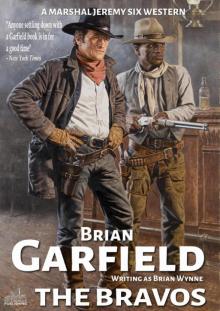 Marshal Jeremy Six #3
Marshal Jeremy Six #3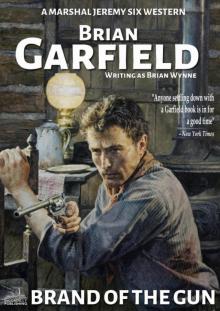 Marshal Jeremy Six #6
Marshal Jeremy Six #6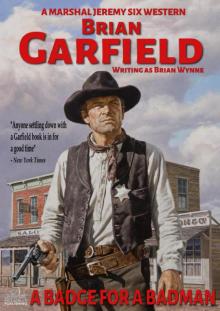 Marshal Jeremy Six #5
Marshal Jeremy Six #5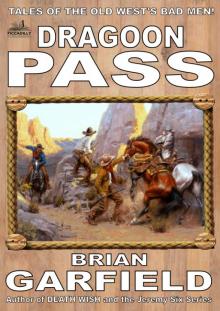 The Outlaws 2
The Outlaws 2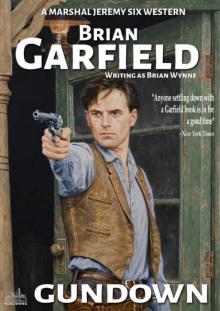 Marshal Jeremy Six #7
Marshal Jeremy Six #7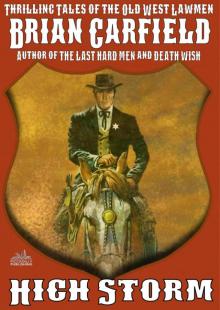 The Lawbringers 4
The Lawbringers 4 Marshal Jeremy Six #4 the Proud Riders
Marshal Jeremy Six #4 the Proud Riders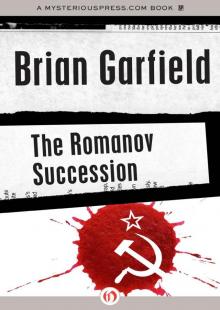 The Romanov succession
The Romanov succession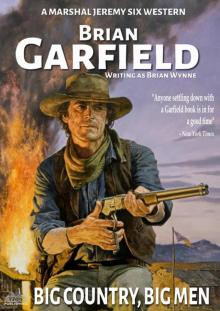 Marshal Jeremy Six #8
Marshal Jeremy Six #8 Sliphammer
Sliphammer Line of Succession
Line of Succession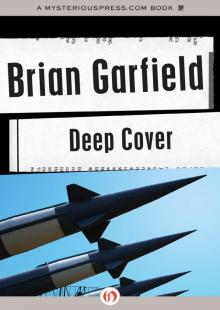 Deep Cover
Deep Cover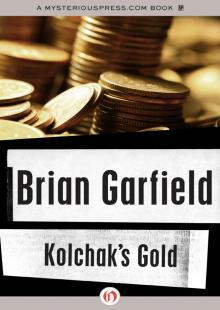 Kolchak's Gold
Kolchak's Gold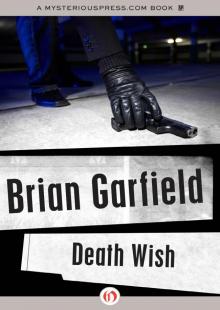 Death Wish
Death Wish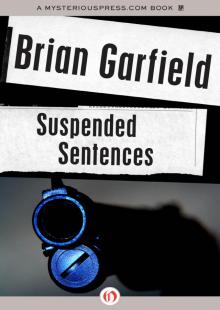 Suspended Sentences
Suspended Sentences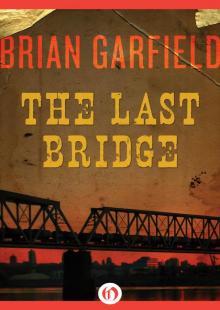 The Last Bridge
The Last Bridge Relentless
Relentless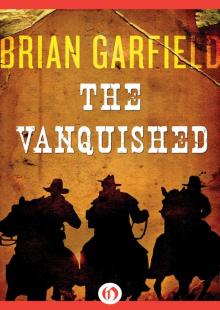 The Vanquished
The Vanquished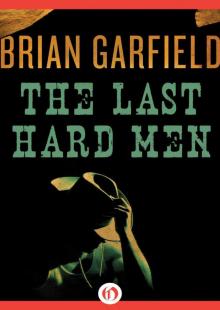 The Last Hard Men
The Last Hard Men Hit and The Marksman
Hit and The Marksman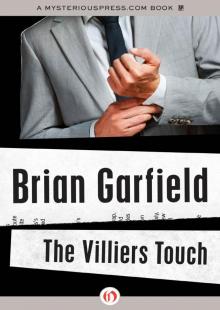 Villiers Touch
Villiers Touch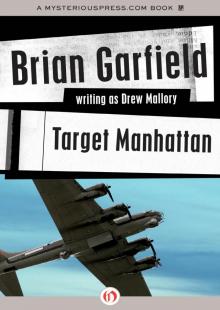 Target Manhattan
Target Manhattan Marchand Woman
Marchand Woman What of Terry Conniston?
What of Terry Conniston?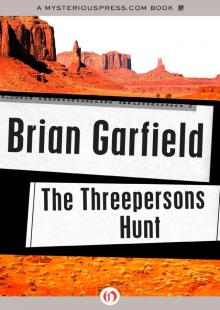 Threepersons Hunt
Threepersons Hunt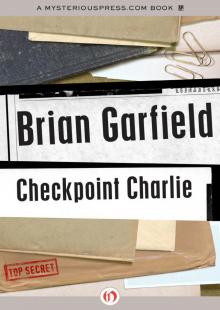 Checkpoint Charlie
Checkpoint Charlie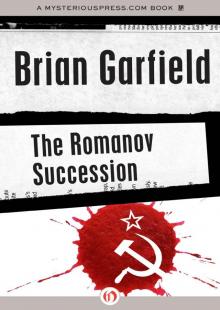 Romanov Succession
Romanov Succession Necessity
Necessity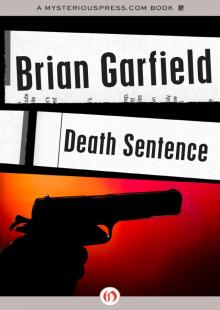 Death Sentence
Death Sentence Fear in a Handful of Dust
Fear in a Handful of Dust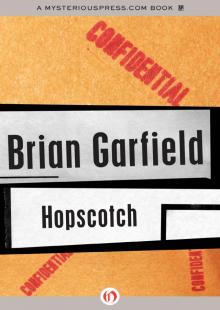 Hopscotch
Hopscotch